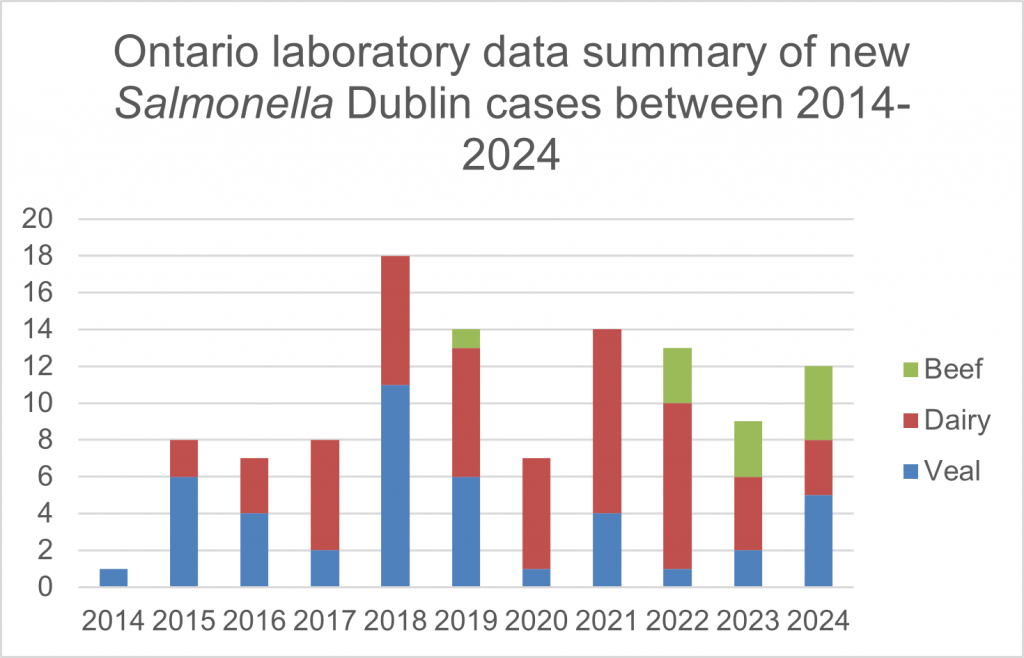Healthy Calf Conference
Follow to stay up-to-date on all Healthy Calf Conference updates. Speaker announcements, sponsorship information, registration announcements, and more.
By Dr. Cynthia Miltenburg on behalf of the Bovine Ontario Animal Health Network
Salmonella Dublin (S. Dublin) is a bacterial disease that primarily affects cattle, particularly young calves. This bacterium is host-adapted to cattle, meaning they are the main carriers and spreaders of this type of Salmonella. Veterinary diagnostic labs from across Canada and the United States, including in Ontario, have reported an increasing number of S. Dublin detections in cattle.
The rise in S. Dublin cases is concerning due to its severe impact on calf health. Infected calves often suffer from pneumonia or septicemia, leading to higher mortality rates. Additionally, S. Dublin is multidrug resistant, making it difficult to treat with antibiotics. This bacterium is also zoonotic, posing a risk to humans through direct contact with infected animals or consumption of affected food products including unpasteurized milk or improperly cooked meat.

The emergence of S. Dublin has spurred more research on its prevalence and risk factors. A 2024 study by the University of Guelph (U of G) found that 5.1 per cent of Ontario dairy herds were positive for S. Dublin based on herd bulk tank milk samples. Similar studies in Quebec, Alberta, and British Columbia reported a range from 6.8 per cent to 30 per cent of herds were positive. While only a minority of Ontario dairy producers have encountered S. Dublin, calf raisers working with veal and dairy-beef calves where cattle are commingled from multiple source farms, are more familiar with its challenges.
A recent U of G study examined associations between S. Dublin infection and health and growth in young, crossbred dairy calves. The study used 160 crossbred male and female dairy calves sourced from auction facilities in Ontario and Quebec arriving at a commercial calf-raising facility. Calves were monitored for diarrhea, respiratory disease scores, body weight, and their S. Dublin status both at arrival and throughout the study period.
Arrival status
On arrival, calves were between three and 10 days of age and five per cent were already positive for S. Dublin.
Infection rates
During the study, 37.5 per cent of live calves tested positive for S. Dublin using blood and fecal tests. An outbreak of S. Dublin occurred, and 23/160 calves died, 17 of which were confirmed to have S. Dublin via postmortem testing. Combining the live and postmortem testing for S. Dublin, 45.6 per cent of calves tested positive for S. Dublin at least once during the study period.
Health status
Respiratory scoring was completed twice daily and measured ocular discharge, nasal discharge, ear droop or head tilt, coughing, breathing, and temperature. Overall, it was found that calves that tested positive for S. Dublin had higher respiratory scores, especially in lighter calves weighing less than 42.6 kg on arrival. No differences were noted with the occurrence of diarrhea by S. Dublin status.
To calf care givers these findings might not come as a surprise. The study highlights the significant risks S. Dublin poses to dairy-beef calves, which are managed through early life similarly to veal cattle. S. Dublin positive status was associated with respiratory disease. The researchers hypothesized lighter calves may also be younger at arrival, however age information was not available.
Producers are already making efforts to prevent entry of S. Dublin and should continue to do so. Buying from known, and as few sources as possible is preferred. Discussing the importance of S. Dublin prevention and biosecurity with source farms may be helpful. Once introduced, a focus on lowering the levels of bacteria in the environment through cleaning and disinfection and stopping transmission to and between young calves by isolating ill animals, handling sick calves last, and paying attention to hygiene can prevent outbreaks. Lastly, a high-level of biosecurity for visitors remains critical. While keeping a closed herd is not possible for calf raisers, this study reminds us that the risk of introduction is real and efforts to avoid introduction and spread of S. Dublin are justified.
The article “Exploring the impact and transmission of Salmonella Dublin in crossbred dairy calves” can be found in full at doi: 10.3168/jds.2024-25875.
References available upon request.
The Bovine Ontario Animal Health Network is a group of veterinarians and specialists working in government, university research, and laboratory, and in beef, dairy, and veal practice who meet regularly to monitor and discuss disease trends in Ontario. Our goals are to facilitate coordinated preparedness, early detection, and response to animal health and welfare in Ontario. For our recent reports or more information visit https://oahn.ca.
Follow to stay up-to-date on all Healthy Calf Conference updates. Speaker announcements, sponsorship information, registration announcements, and more.
The Codes of Practice are nationally developed guidelines for the care and handling of farm animals. They serve as our national understanding of animal care requirements and recommended practices.